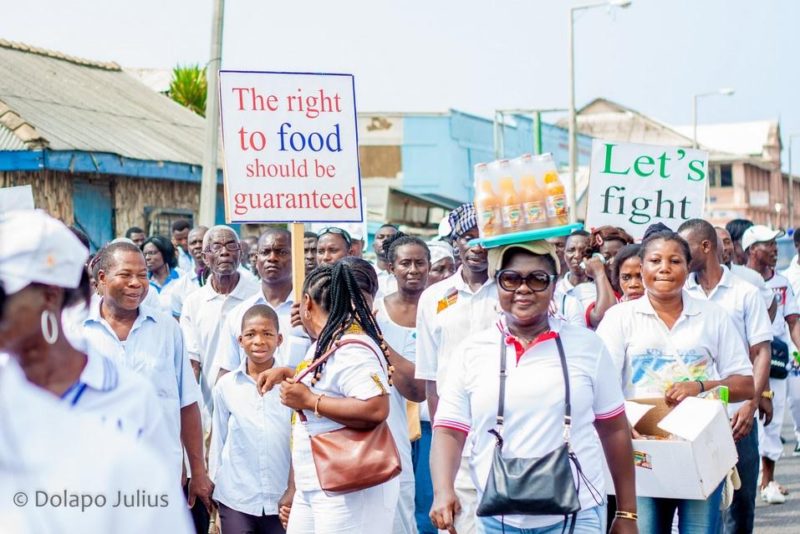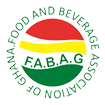- January 26, 2020
- Posted by: capello
- Category: News

Each year about 1.3 billion tons of food is wasted and at the same time about 800 million people do not have access to sufficient and nutritious food (Global FoodBanking Network, 2014). This figure represents roughly one third of food produced for human consumption. Food can be either lost or wasted throughout the supply chain, from initial agricultural production down to final household consumption (FAO, 2011).The Cost of Hunger in Ghana report by the National Development Planning Commission in 2016 shows that Ghana loses GH¢ 4.6 billion which is equivalent to 6.4% GDP annually to hunger among children and 24% of all child mortality cases in Ghana are associated with under nutrition.
The difference between losses and waste lies in the supply chain stage where food is no longer usable for human consumption. Loss occurs when food does not reach the final consumer due to improper handling, packing and storage. Such foods are not suitable for human consumption and only have a marginal value to be transformed as low cost fertilizers and fuel.
Waste occurs when the product that reached the final marketplace is
not consumed due to improper consumer behavior, bad storage practices as
well as to the lack of coordination between different stakeholders in
the supply chain. Food and Beverage Association of Ghana estimates shows it members loss over GH¢200,000 every month to food waste.
In many cases, fresh products are rejected by large supermarket chains if they do not meet certain
quality standards such as shape, size and appearance, regardless of their suitability for human
consumption. In addition, many retail chains discard products before their expiring dates claiming
that the products either are unsellable or generate negative image to the retailer. Consumer’s
attitudes and the consumption culture also play their part as they reject food that is in good
condition but with “not-so-good” appearance. Foods that have reached households are also wasted
because they turn unsuitable for human consumption. Restaurants and hotels are other stakeholders
within the food waste menace, because of the large portions served to
customers. Since not all the portion is consumed, the rest will end up
in the garbage bin.
The role of the local governments in setting up measures and regulations
towards food donation is very critical in ensuring reduction of food
waste and hunger in society.
The PNDCL 3058 Food and Drugs Act.1992 does not make explicit provision for food donations which has resulted in little contribution towards reducing hunger in Ghana by some stakeholder’s within the food supply chain.The Ghana School Feeding Programme been an initiative of the comprehensive Africa Agricultural Development Programme (CAADP) Pillar 3 which seeks to enhance food security and reduce hunger in line with the United Nations (UN) Millennium Development Goals (MDGs) on hunger, poverty and malnutrition had since 2007 been implemented to encourage child enrollment through the provision of one meal per day. Currently the National School Feeding program faces challenges such as expansion and caterers demand for increase of the cost from Gh¢0.80p per child however with a National Food Donors Encouragement Act, private stakeholder businesses in Ghana will donate their excess towards the program.
A lot of initiatives have been launched in Ghana by public, private and civil stakeholders towards improving child under nutrition and hunger in Ghana however little or no attention has been drawn on the role of food recovery and redistribution as a tool towards addressing the problem of hunger and the inefficiencies within our food supply chain.
A study by Food for All Africa programme between 2015-2016 showed that 92% of stakeholders in Ghana’s food supply chain agreed that,with a national regulation mechanism they would want to donate their excess food to the vulnerable rather than waiting for it to go waste and dispose off.
Donors often fear that they will be held legally responsible if recipients of donated food become ill, and this fear discourages them from donating. However, with the National Food Donors Encouragement laws that protect food donors from liability.
The National Food Donors Act will protect
Persons or gleaners making good faith donations of
food or grocery products to non‐profit charitable organizations such as
orphanages, schools and vulnerable communities are protected. A
“gleaner” is someone who harvests donated agricultural crops.
Non‐profit organizations that receive the donated food, and ultimately distribute the donations to those in need are also covered.
Private Businesses donating their excess food products or resources towards creating sustainable means of nutrition for the vulnerable in society. Tax incentives must be given to amount donated.
Good faith/CSR donations, made to non‐profit organizations, ultimately going to those in need are protected. The donations must be:
1) “Apparently wholesome” food.
(2) “Apparently fit” grocery products.
These items meet the PNDCL 3058 Food and Drugs Act, local labeling
and quality standards but may not be readily marketable because of
factors like age, appearance, freshness, grade, or size.
Slightly flawed partially complying donations, made in good faith, are also protected if:
(1) The donor informs the non‐profit of the item’s condition;
(2) The non‐profit knows the standards required to make the item conform;
(3) The non‐profit agrees to recondition the item to meet those standards.
These flaws can include broken packaging or missing labels, or items
needing washing or trimming before distribution. Acceptance of such
items helps use edible food that might otherwise be thrown away due to a
technicality.
How are donors protected?
If the donation is made in good faith (honestly and with sincere
intentions), the National Food Donors Encouragement Act will exempt
those donors from civil or criminal liability which might arise from the
donation’s nature, age, packaging or condition. The law will also
protect donors of food that is “fit for human consumption,” regardless
of compliance with food labeling/ packaging laws and storage/handling by
the recipients.
When are donors not protected?
Liability arises if a food donor or recipient organization knows that
their actions will harm or are likely to harm the recipient, and
consciously acts anyway – i.e., gross negligence or intentional
misconduct.
Under the Food Donors Encouragement bill, gross negligence is a much higher standard than
ordinary negligence. Gross negligence should mean that a donor (or recipient organization) knew
when it acted that its conduct was likely to harm someone else, and
consciously acted (or failed to act), regardless of that knowledge.
Under the Bill, Intentional misconduct means a donor (or recipient organization) deliberately acted with knowledge that its actions would be harmful to others.
Why donate?
Donation of surplus food connects those in need with edible food that
would otherwise be sent to landfills. 3 out of 5 children out of the
90,000 street children in Accra who are out of school run away from
orphanages due to lack of regular means of nutrition. These people are
part of the city’s population that does not have sufficient access or
resources available to obtain and consume enough nutritious food to
support a healthy life.
In Ghana,1 out of 4 children goes to bed hungry (UNICEF ,2015) at a
time when 45% of food goes uneaten and much of that contributes to the
over 15 million tons of food that ends up rotting in landfills.
Connecting hungry people with available food helps combat both of these
critical problems.
Donations also create savings for donors by lowering the costs of food
disposal and the opportunity for charitable food donation tax
deductions.
Why Food for All Ghana Programme?
Food for All Ghana programme makes the surplus food donation process
easy, by picking up and transporting food and grocery item donations to
the places and programs that need them. This helps
valuable programs stretch their limited budgets during a time of
decreasing government and foundation funding, keeps edible food out of
landfills, and most importantly, helps hungry people have better access
to a nutritious meal. Food for All Africa has since 2015 been operating
West Africa’s first community food support centre and have created a
forum for stakeholder’s within Ghana’s food supply chain to work
together towards reducing hunger in Ghana and accelerate Ghana’s effort
in attaining the UN SDG 2 and 12.
Considering the outcome of research and report from the 1st
Food for All Ghana conference held in 2016, the need for a nationwide
protection offered by a National Food Donors Encouragement Act, the
valuable incentives for reducing hunger and wasting food, and the ease
of expanding the National Food feeding program, Food for All Africa
programme on 15th June, 2017 will launch a two year’s multi-stakeholder National campaign for the passage of the Food Donors Encouragement Bill.
